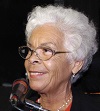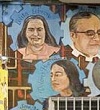Freedom Archives Productions
These materials were used in various Freedom Archives productions released between 2000 and 2013.
Subcollections
- Compact discs and videos representing digitized copies of analog tapes
-
Freedom is a Constant Struggle
The Freedom Is A Constant Struggle collection extends from February 1976 to August 1995. It continues the weekly summary of international, national, and local struggles on many fronts, interspersed with poetry and music. - General materials
-
La Lucha Continua: a talking mural in San Francisco
"La Lucha Continua/The Struggle Continues" is the result of a 3 year collaboration between Susan Greene and Freedom Archives. -
Materials Recorded and Gathered for "Wild Poppies"
Poetry and spoken word by activists, poets, and political prisoners. - Materials shot and gathered for the making of “Charisse Shumate: Fighting for our Lives”
- Materials shot and gathered for the making of “Legacy of Torture”
- Paul Robeson recordings
- Video materials shot and collected in the making of Cointelpro 101
- COINTELPRO 101 Raw Materials
Documents
Call Number: CD 004Format: CDProducers: Disco RebeldeCollection: Compact discs and videos representing digitized copies of analog tapes
Collection of poetry and music in honor of Che Guevara and the Day of the Heroic Guerilla, October 8th. Fidel reads Che’s last letter
Date: 7/26/1986Call Number: FI 077Format: 1/4 7 1/2 ipsProducers: Lincoln Bergman, Claude MarksProgram: Freedom Is A Constant StruggleCollection: Freedom is a Constant Struggle
This is the memorial program for the 1953 attack on the Moncada Barracks in Cuba
Date: 5/23/1974Call Number: FI 052Format: 1/4 7 1/2 ipsProducers: Nancy Barrett, Claude MarksProgram: Nothing Is More Precious ThanCollection: Freedom is a Constant Struggle
Brief narrative for 1974 rebroadcast of Moncada Barracks attack commemoration program, mostly produced earlier.
Date: 12/18/1963Call Number: CD 047Format: CDCollection: Compact discs and videos representing digitized copies of analog tapes
Che Guevara is asked many questions by American journalists. Translated from Spanish on the spot. Questions range from bureaucracy, Cuban propaganda, the Black struggle in America, Puerto Rico. When asked, “Do you think it will be possible for Latin America to live in peace without the fall of the U.S. Government”? He replies that the question is difficult but there will be a need for struggle.
Date: 12/11/1964Call Number: CD 048Format: CDCollection: Compact discs and videos representing digitized copies of analog tapes
From Cuban LP released for the 5th Anniversary of his death, Che Guevara’s address to the United Nations General Assembly
Date: 12/11/1964Call Number: CD 049Format: CDCollection: Compact discs and videos representing digitized copies of analog tapes
From Cuban LP released for the 5th Anniversary of his death, Che Guevara’s address to the United Nations General Assembly
copy of CD 048
Date: 6/14/1973Call Number: CD 201Format: CDProducers: Paredon P-1017Collection: Compact discs and videos representing digitized copies of analog tapes
Around forty minutes of Che's speeches, together with some contemporary Cuban songs. Includes his 'In Commemoration Of Camilo Cienfuegos', 'United Nations Speech, December 11, 1964' and his Tribute To Antonio Maceo, December 7 1962. Fidel Castro reading Che's Farewell Letter To Fidel, April 1965. The liner notes include full transcriptions, some history, and English translations of the entire CD. "We are not rehearsing final gestures; we want life, and we shall defend it."
Call Number: CD 258Format: CDCollection: Compact discs and videos representing digitized copies of analog tapes
Past President Richard Nixon is interviewed by Frost about the US reasons for cutting off financial assistance to Chile after Allende was elected as well as the reasons why the US supported Pinochet after the coup. He states that, because Chile was exapropriating American property, Allende was a threat to the United States. On the difference between Pinochet and Allende, Nixon says that Allende posed a security threat to the US (the threat of becoming another Cuba- the “Red Sandwich” analogy) because his government was a “left-wing dicatorship” while Pinochet’s regime was more of a human rights concern. That the US only disapproved of Pinochet’s internal policies but his foreign policy was fine.
Date: 1/1/1983Call Number: CD 264Format: CDCollection: Compact discs and videos representing digitized copies of analog tapes
Leader of the New Jewel Movement and Prime Minister of Grenada, Maurice Bishop (1944-1983) gives a rousing speech to a fiery audience at Hunter College in New York City shortly before his US-backed overthrow and execution. Speaking on the vision of a new Grenada, Bishop emphasizes an institutional system of popular democracy which would strive to include the participation of all Grenadians especially that of women, youth, and labor-segments of the population previously subject to brutal repression under corrupt previous governments and British colonialism. Bishop also speaks on the necessity of an internationalist perspective especially when standing in solidarity with Latin American and African nations struggling against imperialism and counter-insugency terrorism, and for self determination. Bishop also addresses Grenada’s relationship with Cuba and pays special attention to the construction of the Grenadian International Airport and the disinformation campaign promulgated by the US surrounding Grenadian-Cuban solidarity. This section of the speech take on an eerie air as it was the construction of this airport and Grenada’s relationship with Cuba that was used as pretext for the US invasion of the island, resulting in the murder of Bishop.
Date: 1/1/1983Call Number: CD 263Format: CDCollection: Compact discs and videos representing digitized copies of analog tapes
Leader of the New Jewel Movement and Prime Minister of Grenada, Maurice Bishop (1944-1983) gives a rousing speech to a fiery audience at Hunter College in New York City shortly before his US-backed overthrow and execution. Speaking on the vision of a new Grenada, Bishop emphasizes an institutional system of popular democracy which would strive to include the participation of all Grenadians especially that of women, youth, and labor-segments of the population previously subject to brutal repression under corrupt previous governments and British colonialism. Bishop also speaks on the necessity of an internationalist perspective especially when standing in solidarity with Latin American and African nations struggling against imperialism and counter-insugency terrorism, and for self determination. Bishop also addresses Grenada’s relationship with Cuba and pays special attention to the construction of the Grenadian International Airport and the disinformation campaign promulgated by the U.S. surrounding Grenadian-Cuban solidarity. This section of the speech take on an eerie air as it was the construction of this airport and Grenada’s relationship with Cuba that was used as pretext for the US invasion of the island, resulting in the murder of Bishop.




